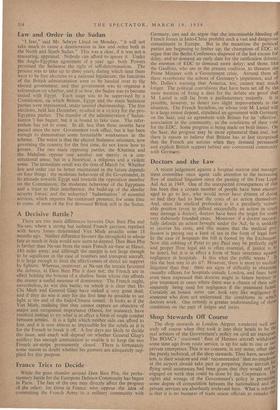Doctors and the Law
A recent judgement against a hospital matron and manage- ment committee once again calls attention to the increasing flow of medical litigation since the passing of the Free Legal Aid Act in 1949. One of the unexpected consequences of this has been that a certain number of people have been encour- aged to go to law, who would never have dreamt of doing so had they had to bear the costs of an action themselves. And, since the medical profession is in a peculiarly vulner- able position (even to defend successfully an action in court may damage a doctor), doctors have been the target for some very dubiously founded cases. Moreover, if a doctor success- . fully defends an action brought under the Act, he is unlikelY to recover his costs, and this means that the medical pro- fession is paying out a kind of tax in the form of legal fees. In the case of hospitals the bill is footed by the Exchequer. Now this, robbing of Peter to pay Paul may be perfectly right', and proper (free legal aid is often essential, if justice is 10 be done), but it is in effect a form of State insurance against negligence in hospitals. Is this what the public wants '? is this the best way to do it? • However,-there is more to medical litigation than that : there are signs of difficulty in obtaining casualty officers for hospitals outside London, and fears have even been expressed that doctors might in future hesitate 10 give treatment in cases where there was a chance of their sub- sequently being sued for negligence if the treatment failed, Certainly an honest error can look very like negligence to someone who does not understand the conditions in which doctors work. One remedy is greater understanding of those conditions on the part of judges and juries.


































 Previous page
Previous page